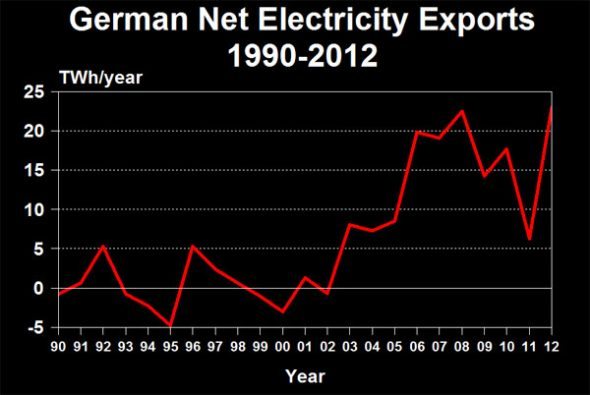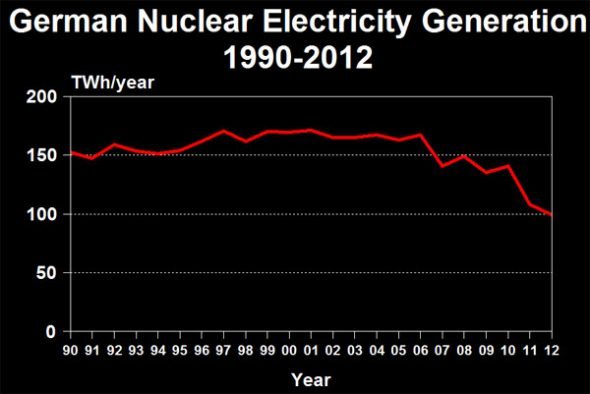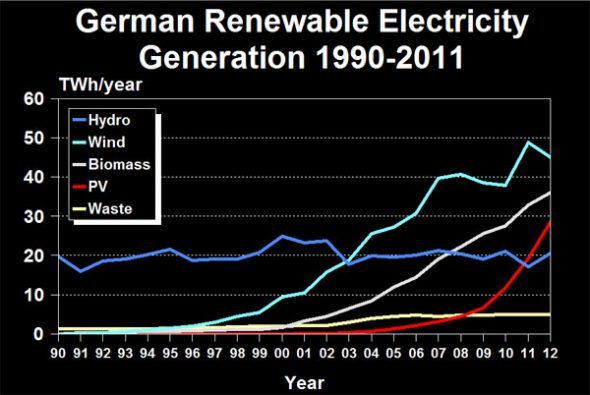Environment & Energy
Related: About this forumFuture of fossil fuels: Back-up for renewables
Have you seen this meme being pushed on DU?
"The nuclear industry has been trying to ridicule Angela Merkel’s decision to exit nuclear, suggesting that without nuclear grid operators will simply turn to more polluting energy sources such as coal or gas. Germany is their Exhibit A, where they insist that 20GW of coal-fired power will be required to be built to substitute for retired nuclear plant."
Here is what those pushing that meme know, but hope no one will mention:
By Giles Parkinson on 28 August 2012
The two largest electricity utilities in Germany – E.ON and RWE – have declared they will build no more fossil fuel generation plants because they are not needed, challenging a widespread belief that the phasing out of nuclear in Europe’s most industrialised economy will require more coal-fired generation to be built.
Both E.ON and RWE say the rapid expansion of renewable energy, particularly solar but also wind, would make up for the loss of capacity from nuclear. “We won’t be building any more gas and coal power generation plants in western Europe, because the market does not need them,” a spokesman for E.ON told reporters at a briefing at the group’s headquarters on Friday. RWE made a similar statement a week earlier. A third major operator, Vattenfall, agreed that the market in Western Europe is oversupplied but said some limited capacity may be needed in the southern part of Germany.
The nuclear industry has been trying to ridicule Angela Merkel’s decision to exit nuclear, suggesting that without nuclear grid operators will simply turn to more polluting energy sources such as coal or gas. Germany is their Exhibit A, where they insist that 20GW of coal-fired power will be required to be built to substitute for retired nuclear plant.
But that’s not happening. The only fossil fuel plants that are being built are those committed to, or commenced, before the nuclear phase out was announced. And not only do Germany’s two biggest utilities dismiss the need for additional coal or gas capacity, they say that the current fossil fuel generation will ultimately be relegated to a role of back-up generation for renewables, rather than being called upon to supply “baseload” power. In some cases it is already happening. Indeed, a 2,200MW lignite-fuelled power station opened by RWE this month is designed to act as a sort of peaking plant, with the ability to ramp up (and down) 500MW of capacity within 15 to 30 minutes.
This is a fundamental transformation of the energy industry...
http://reneweconomy.com.au/2012/future-of-fossil-fuels-back-up-for-renewables-99836
And this is where you end up:
ABSTRACT - We model many combinations of renewable electricity sources (inland wind, offshore wind, and photovoltaics) with electrochemical storage (batteries and fuel cells), incorporated into a large grid system (72 GW). The purpose is twofold: 1) although a single renewable genera- tor at one site produces intermittent power, we seek combinations of diverse renewables at diverse sites, with storage, that are not intermittent and satisfy need a given fraction of hours. And 2) we seek minimal cost, calculating true cost of electricity without subsidies and with inclusion of external costs. Our model evaluated over 28 billion combinations of renewables and storage, each tested over 35,040 h (four years) of load and weather data. We find that the least cost solutions yield seemingly-excessive generation capacity—at times, almost three times the electricity needed to meet electrical load. This is because diverse re- newable generation and the excess capacity together meet electric load with less storage, lowering total system cost. At 2030 technology costs and with excess electricity displacing natural gas, we find that the electric system can be powered 90%–99.9% of hours entirely on renewable electricity, at costs comparable to today's—but only if we optimize the mix of generation and storage technologies.
http://www.sciencedirect.com/science/article/pii/S0378775312014759
FBaggins
(26,721 posts)"Hey! Those coal plants were already under construction... so they don't count!"

Let's just ignore that Germany was on their way to ending brown coal and now are expanding their mining... (on edit - ok... it was black coal that they were cutting a few years ago - but they certainly weren't planning on the resurgence of brown coal production that we're now watching)
Let's just ignore that if you burn more coal at existing plants you're still expanding coal generation... How much coal/oil is Japan burning now compared to three years ago? Was any of the increase due to new plants? I'm pretty sure that the answer is "no".
Let's just ignore that older coal plants were brought out of retirement - they don't count either...
Let's just ignore that those 5+ GW of coal plants coming on line this year were supposed to replace older dirtier coal plants... and now they only expect to retire 1 GW (largely re-retiring plants that are far too old). Coal generation capacity is expanding when it was suppose to contract - but don't look there!
Oh... and let's also ignore the fact that they haven't retired all that much of their nuclear generation yet. There's more to be replaced.
Just focus on what I've got in my hand. That's the only thing that matters.
kristopher
(29,798 posts)The nuclear industry tried to scare the people of Germany with HUGE pack of lies. Those lies have now been shown for what they were. You attempting to muddy the water with more of the same isn't going to salvage the situation.
Why German Conservatives Should Learn to Stop Worrying and Love Renewables
by Paul Hockenos
The Merkel administration’s ambiguous relationship with the country’s transition to renewable energy, or Energiewende, speaks volumes about German conservatives’ troubled relationship with the clean energy transition. At some opportunities, Merkel and her lieutenants praise to the sky the clean energy switch that Merkel embraced in the aftermath of the 2011 Fukushima disaster. But at other times, they urge caution, gripe that everything is moving much too quickly, and damn the transition for high consumer prices.
The fact is that German conservatives are split over the Energiewende, with the nay-sayers still largely predominant. This is a huge miscalculation, not only with negative implications for Germany but for German conservatism, which is forsaking a topic that fits in well with a conservative world view and will continue to cost its parties votes if their energy hawks win the day.
The Christian Democrats have had a small, environmentally friendly, pro-renewable energy wing since the 1980s. In line with conservative ideology, they emphasize environmental justice for future generations, ecological conservation, the responsibility to respect God’s creations, and opportunities for entrepreneurs. These are fundamental conservative values.
Few observers remember that it was not the Greens who initiated incentives for clean energy in Germany, but rather Helmut Kohl’s government in the early 1990s. Kohl was pushed to do so not by Green Party tree huggers but by conservative landowners with small hydro-power operations who wanted to sell their electricity to the utilities. Probably even fewer remember that the earliest formations of the Greens in the late 1970s/early 1980s included the likes of the former CDU minister Herbert Gruhl. But Gruhl and a mixed bag of other conservatives fled the party when the splintered detritus of the ultra-left factions, including one disillusioned anarchist by the name of Joschka Fischer, appeared on the scene, yanking it to the left – where it remains today.
Since then, German conservatives have by and large abdicated clean-energy topics to the left...
http://goo.gl/LnIjl
Courtesy of Paul Gipe










http://reneweconomy.com.au/2013/graph-of-the-day-german-gas-nuclear-fall-while-renewables-grow-73346
NickB79
(19,224 posts)They clearly show an increase, though moderate, in coal-fired generation, after what appeared to be the beginnings of a substantial decline a few years ago.
It does appear that renewables are displacing gas, which is excellent, but so far the growth in renewables doesn't appear to be displacing coal in a similar fashion.
And all this at a time when electricity production has essentially flatlined.
kristopher
(29,798 posts)My position is that the nuclear industry LIED about the consequences of shutting down the nuclear plants. What those graphs show is that those lies were just that - lies.
Among those lies is the one you seem to be presently defending - that the new coal plants coming online are a response to the decision to close the nuclear plants. Those plants were in the pipeline long before the post Fukushima decisions were made.
Your new twist is that they are pulling retired coal plants back into service and are now planning to keep in service the dirtier ones scheduled for retirement.
Please provide quantified evidence of those assertions.
FBaggins
(26,721 posts)Try the same data with weekly/monthly numbers just from about 2009... rather than muddying the waters with far older data that's entirely irrelevant to the conversation and taking just annual averages that hide much of the negative impact.
Playing games with the data like that isn't honest... and it isn't the nuclear industry doing the lying.
FBaggins
(26,721 posts)Because more spam certainly doesn't cut it.
Oh... and another thing that you've forgotten to mention. Hardly any of their new renewables generation was planned post-3/11. In fact, with some of their offshore wind so far behind schedule, their current renewables capacity might not even be as high as it was planned to be at this point (pre-3/11).
So if that nuclear generation were not shut down... it's most certainly their coal usage that would have been.
kristopher
(29,798 posts)You made two claims, that they are pulling plants out of retirement and that they are not going to shut down the older plants as planned.
Please document those claims. And don't give me an instance of pulling one plant out of mothballs to be on standby during the coldest winter months, either. You are clearly saying this is a meaningful trend.
Prove it.
kristopher
(29,798 posts)quadrature
(2,049 posts)this story is rubbish